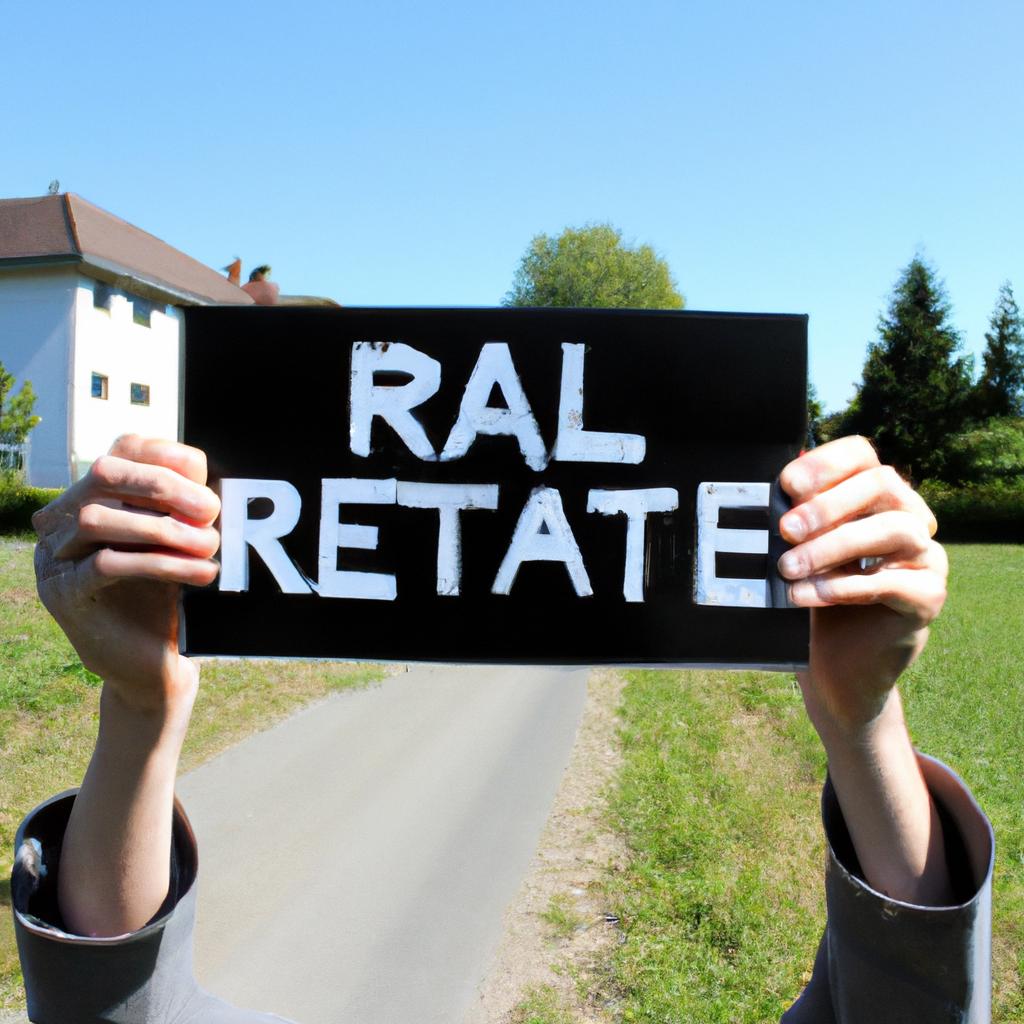Wholesaling in Real Estate Investing: A Comprehensive Guide
Wholesaling in real estate investing is a strategic approach that has gained significant popularity in recent years. This comprehensive guide aims to provide readers with an in-depth understanding of the concept, its benefits, and the steps involved in successfully executing wholesale transactions. To illustrate the potential profitability of wholesaling, let us consider a hypothetical scenario: John, an aspiring real estate investor, identifies a distressed property owned by Sarah who needs to sell it quickly due to financial constraints. Recognizing the opportunity at hand, John enters into a contract with Sarah to purchase the property below market value. Rather than closing on the deal himself, however, John assigns his rights as the buyer to another investor for a fee – effectively acting as a middleman between Sarah and the ultimate purchaser.
The primary objective of this guide is to equip individuals interested in real estate investing with the knowledge and skills necessary to navigate the complexities of wholesaling successfully. It will delve into key aspects such as identifying potential properties for wholesale deals, negotiating contracts with sellers under favorable terms, marketing tactics to attract prospective buyers, and legal considerations associated with assigning contracts. Moreover, this article will explore how wholesalers can leverage their network and build relationships with investors and other industry professionals to maximize their chances of success. By providing practical insights and actionable strategies, this guide aims to empower readers to take advantage of the lucrative opportunities that wholesaling in real estate investing can offer.
One crucial aspect of wholesaling is the ability to identify potential properties for wholesale deals. This involves understanding market trends, analyzing distressed properties, and conducting thorough research on property owners facing financial constraints or other circumstances that may make them motivated sellers. By honing these skills, wholesalers can uncover hidden gems and secure properties at below-market prices, setting the stage for profitable transactions.
Negotiating contracts with sellers is another critical skill that wholesalers must master. This includes effectively communicating with sellers, understanding their needs and motivations, and structuring agreements that are mutually beneficial. Wholesalers need to strike a balance between securing favorable terms for themselves while still offering an attractive solution to the seller’s problem.
Once a property is under contract, wholesalers must employ effective marketing tactics to attract prospective buyers. This may involve utilizing various channels such as online listings, social media platforms, networking events, and direct mail campaigns. The goal is to generate interest and create a sense of urgency among potential buyers who recognize the value in acquiring a discounted property through a wholesale transaction.
Legal considerations are also paramount in wholesaling real estate deals. Wholesalers must ensure they operate within the boundaries of local laws and regulations governing real estate transactions, including assigning contracts. Understanding these legal requirements will safeguard wholesalers from potential pitfalls and protect their interests throughout the process.
Furthermore, building a robust network of investors and industry professionals is essential for wholesalers looking to maximize their success. This includes cultivating relationships with cash buyers who have the resources and willingness to purchase properties quickly at wholesale prices. Additionally, developing connections with real estate agents, contractors, lenders, and other key players in the industry can provide valuable resources and support along the way.
In conclusion, wholesaling in real estate investing offers a unique opportunity for aspiring investors to capitalize on undervalued properties by acting as intermediaries between motivated sellers and cash buyers. By mastering the art of identifying potential properties, negotiating contracts, implementing effective marketing strategies, understanding legal considerations, and building a strong network, wholesalers can pave their way to financial success in the real estate market.
The Basics of Wholesaling
To understand the concept of wholesaling in real estate investing, imagine a scenario where an investor, let’s call him John, comes across a distressed property. The house is in need of significant repairs and the owner is motivated to sell quickly due to financial constraints. John sees an opportunity here – he can purchase the property at a discounted price and then assign his rights to buy it to another buyer for a fee.
Wholesaling involves three main steps: finding distressed properties, negotiating with sellers, and assigning the contract. Finding distressed properties is crucial as these are often sold below market value. Investors utilize various strategies such as networking with local agents, attending foreclosure auctions, or marketing directly to homeowners facing foreclosure. By targeting distressed properties, investors increase their chances of finding lucrative deals.
Negotiating with sellers requires effective communication skills and knowledge of market conditions. Investor should conduct thorough research on comparable sales in the area to determine a fair offer price. It is important to build rapport with the seller and understand their motivations for selling. Negotiation tactics may include presenting multiple offers or emphasizing a quick closing timeline.
After successfully negotiating a deal, the investor will enter into a purchase agreement with the seller. This agreement provides them with equitable interest in the property but does not obligate them to close on the purchase themselves. Instead, they have the option to assign this contract to another buyer who will ultimately take over and complete the transaction.
In summary, wholesaling in real estate investing involves identifying distressed properties that can be purchased below market value, negotiating favorable terms with sellers by leveraging market knowledge and effective communication skills, and finally assigning the contracted rights to another buyer for a fee. In our next section about “Finding Distressed Properties,” we will explore different strategies that investors employ to locate these profitable opportunities efficiently.
Emotional Response Bullet Points
- Opportunity: Wholesaling presents investors with an opportunity to profit from distressed properties.
- Financial Gain: By purchasing below market value and assigning the contract, investors can generate significant profit margins.
- Problem-solving: Wholesaling allows investors to help distressed sellers by providing them with a quick solution to their financial challenges.
- Networking and Learning Opportunities: Engaging in wholesaling provides opportunities for networking with industry professionals and gaining valuable insights into real estate investing.
Emotional Response Table
| Opportunity | Financial Gain | Problem-solving | |
|---|---|---|---|
| Wholesaling | ✓ | ✓ | ✓ |
Note: The table above highlights the emotional responses that wholesaling evokes in investors – the opportunity for profit, financial gain, and problem-solving.
In the subsequent section about “Finding Distressed Properties,” we will delve deeper into various strategies employed by real estate investors to locate these potentially lucrative opportunities.
Finding Distressed Properties
Transitioning from the basics of wholesaling, let us now delve into the crucial aspect of finding distressed properties. To illustrate this process, consider a hypothetical scenario where an aspiring real estate investor named John is looking to find properties that can be purchased at a discounted price.
One effective method for finding distressed properties is through networking with other investors and industry professionals. By attending local real estate investment club meetings or joining online forums, John can establish connections with like-minded individuals who might have leads on distressed properties. These networks often provide valuable insights and opportunities that may not be readily available elsewhere.
Alternatively, John could explore public records such as foreclosure listings or tax lien auctions to identify potentially distressed properties. These records typically contain information about homeowners who are facing financial difficulties or property owners who have fallen behind on their taxes. By diligently researching these sources, John can uncover promising prospects for his wholesale endeavors.
In addition to networking and public records research, there are several other strategies that John can employ when searching for distressed properties:
- Targeting neighborhoods with high foreclosure rates.
- Building relationships with local wholesalers who specialize in sourcing distressed properties.
- Utilizing online platforms specifically designed for listing off-market distressed properties.
- Engaging in direct marketing campaigns to reach out to motivated sellers.
To better understand the various approaches mentioned above, refer to the table below which highlights their advantages and potential challenges:
| Strategy | Advantages | Challenges |
|---|---|---|
| Targeting neighborhoods with high foreclosure rates | Potential access to a large pool of distressed properties | Competitive market conditions |
| Building relationships with local wholesalers | Access to pre-screened deals | Increased competition |
| Utilizing online platforms | Convenient way to search for off-market deals | Limited availability in certain areas |
| Engaging in direct marketing campaigns | Ability to target specific demographics and properties | Requires time, effort, and financial resources |
By utilizing these strategies and exploring different avenues for finding distressed properties, John can increase his chances of identifying lucrative opportunities. The next section will focus on the crucial skill of negotiating with sellers, highlighting key techniques to secure favorable deals.
Transitioning into Negotiating with Sellers: With a solid understanding of how to find distressed properties, John is now ready to enhance his negotiation skills in order to strike successful deals.
Negotiating with Sellers
Finding Distressed Properties can be a challenging task for real estate investors. However, with the right strategies and resources, it is possible to identify lucrative opportunities in the market. Let’s explore some effective methods that can help you locate distressed properties and capitalize on them.
One approach is to establish relationships with local real estate agents who specialize in handling distressed properties. These professionals often have access to exclusive listings and can provide valuable insights into the market. For instance, imagine you are interested in purchasing a property below its market value. By networking with an experienced agent like Jane Smith, who has successfully closed multiple deals involving distressed properties, you gain access to her expertise and connections.
Another method involves leveraging online platforms and databases specifically designed for distressed property searches. Websites such as Foreclosure.com or Auction.com offer comprehensive databases where you can find foreclosure auctions, bank-owned properties, or short sales. Utilizing these platforms allows you to expand your reach beyond your immediate area and explore opportunities nationwide.
In addition to utilizing professional networks and online resources, driving through neighborhoods known for distress can also yield promising results. Sometimes distressed homeowners may not list their properties immediately or work directly with agents but instead display signs of financial hardship visible from outside their homes. Taking note of these signs during your drive-throughs could potentially lead to off-market deals.
- Opportunities for significant profit margins
- Chance to revitalize neglected neighborhoods
- Helping families facing financial difficulties find solutions
- Contributing to economic growth by rehabilitating dilapidated properties
Additionally, let’s illustrate the potential impact of investing in distressed properties using a table:
| Property | Purchase Price ($) | Renovation Cost ($) | Final Sale Price ($) |
|---|---|---|---|
| Property A | $70,000 | $30,000 | $150,000 |
| Property B | $80,000 | $40,000 | $200,000 |
| Property C | $90,000 | $20,000 | $180,000 |
| Property D | $60,000 | $50,000 | $160,000 |
As you can see from the table above, investing in distressed properties has the potential to yield substantial returns on investment. By purchasing properties below market value and renovating them strategically, investors can sell at higher prices and achieve profitable outcomes.
In summary, finding distressed properties requires a combination of networking with real estate agents specializing in such deals, utilizing online platforms dedicated to foreclosures or short sales searches, and observing neighborhoods for signs of distress during drive-throughs. The emotional aspects associated with this process include profit opportunities, community revitalization efforts, helping families in need, and contributing to economic growth. Next up is the section on “Negotiating with Sellers,” where we will explore strategies to secure favorable deals when dealing directly with property owners.
Determining the Property’s Value
By understanding how to accurately assess a property’s worth, real estate investors can make informed decisions and negotiate favorable deals. This section will delve into the various methods used to determine a property’s value.
Determining the Property’s Value:
To illustrate this process, let us consider an example scenario where an investor comes across a distressed property in need of repairs. The first step in determining its value is conducting market research. This involves analyzing recent sales data for similar properties in the area, taking note of their selling prices and any unique features that may affect value.
Once armed with this information, investors often employ one or more valuation approaches to arrive at an estimate of the property’s worth. These include:
-
Comparative Market Analysis (CMA): A CMA involves comparing the subject property to recently sold comparable properties in terms of location, size, condition, and amenities. This approach helps identify potential pricing trends and offers insights into market demand.
-
Income Capitalization Approach: Primarily applicable for income-generating properties such as rental units or commercial buildings, this method estimates value based on projected future cash flows generated by the asset.
-
Cost Approach: Particularly useful when dealing with new construction or unique properties lacking comparables, this approach determines value by evaluating what it would cost to replace or reproduce the structure from scratch.
-
Gross Rent Multiplier (GRM) Method: Commonly employed for residential rental properties, this method calculates value by multiplying gross annual rents by a predetermined multiplier specific to the local market.
It is important for investors to carefully consider each valuation approach and use discretion depending on factors like property type, location, and intended use. Ultimately, accurate determination of a property’s value empowers investors during negotiations and ensures they do not overpay for an investment opportunity.
Having established a solid understanding of property valuation, the next crucial step in wholesaling is effectively marketing and selling the property. By employing strategic techniques to attract potential buyers, investors can ensure a swift and profitable transaction.
(Note: Continue writing the subsequent section about “Marketing and Selling the Property”)
Marketing and Selling the Property
Having determined the value of a property, it is now crucial to focus on effectively marketing and selling it. By employing strategic tactics, real estate wholesalers can maximize their chances of attracting potential buyers and closing profitable deals.
To illustrate how effective marketing strategies can lead to successful wholesaling transactions, let’s consider the following hypothetical scenario:
Imagine a real estate wholesaler who has acquired a distressed property in a desirable neighborhood at a significantly discounted price. The first step in marketing this property would be to build awareness among potential buyers by utilizing various channels such as online listings, social media platforms, and local advertisements. This ensures that interested parties are aware of the opportunity presented by this investment.
Once prospective buyers have been attracted, providing them with comprehensive information about the property becomes essential. This includes highlighting any unique or valuable features, listing key specifications (e.g., square footage, number of bedrooms), showcasing high-quality images or videos, and outlining potential renovation opportunities. By presenting an accurate portrayal of the property’s attributes, wholesalers establish credibility and increase buyer interest.
In order to create urgency and drive competitive bidding amongst potential buyers, it is advantageous for wholesalers to implement certain strategies:
- Hosting open houses or private viewings allows interested individuals to physically experience the property firsthand.
- Setting specific deadlines for offers creates a sense of urgency and encourages quick decision-making.
- Offering incentives such as seller financing options or reduced terms can attract more serious buyers.
- Building relationships with other industry professionals like real estate agents or investors can help generate referrals and expand networking opportunities.
By implementing these proven marketing techniques, wholesalers enhance their chances of securing lucrative deals while minimizing holding costs associated with properties.
| Tips for Effective Marketing | Advantages |
|---|---|
| Highlight unique features | Increases buyer interest |
| Provide accurate details | Establishes credibility |
| Create urgency through deadlines | Encourages quick decision-making |
| Offer incentives | Attracts more serious buyers |
In conclusion, marketing and selling a property effectively are crucial steps in the wholesaling process. By employing strategic tactics to build awareness, provide comprehensive information, and create urgency among potential buyers, wholesalers increase their chances of closing profitable deals. In the subsequent section, we will explore the legal considerations that should be kept in mind when engaging in real estate wholesaling transactions.
Now let’s delve into the legal considerations involved in real estate wholesaling.
Legal Considerations in Wholesaling
In the previous section, we discussed the important aspects of marketing and selling a property in real estate wholesaling. Now, let’s shift our focus to the legal considerations that come into play when engaging in this type of investment strategy. To illustrate these considerations, let’s consider a hypothetical case study involving John, a real estate investor.
John recently entered into a contract with a motivated seller to purchase their distressed property at a significantly discounted price. However, before proceeding further with the transaction, it is crucial for John to ensure compliance with all applicable laws and regulations. Here are some key legal considerations he should keep in mind:
- Contractual Agreements: It is essential for wholesalers like John to have clear and legally enforceable contracts with both sellers and potential buyers. These agreements must outline the terms of the deal, including assignment clauses or double-closing provisions if necessary. Failure to establish proper contractual arrangements can lead to disputes and even legal consequences.
- Licensing Requirements: In certain jurisdictions, individuals engaging in wholesaling may be required to obtain specific licenses or certifications from local authorities or regulatory bodies. Failing to comply with such requirements could result in penalties or fines.
- Disclosure Obligations: Wholesalers have an obligation to disclose any material facts about the property they are selling. This includes disclosing any known defects or issues that might affect its value or desirability. Failure to provide accurate information may expose wholesalers like John to potential lawsuits alleging fraud or misrepresentation.
- Anti-Flipping Regulations: Some areas have anti-flipping regulations designed to prevent fraudulent practices in real estate transactions. These regulations typically impose restrictions on reselling properties within a certain timeframe after acquisition by wholesalers. Violating anti-flipping rules can lead to severe financial penalties and reputational damage.
To gain a better understanding of how these legal considerations impact real estate wholesaling, let’s take a look at the following table:
| Legal Consideration | Importance | Consequences of Non-Compliance |
|---|---|---|
| Contractual Agreements | High | Potential legal disputes and financial loss |
| Licensing Requirements | Medium | Penalties, fines, or inability to conduct business legally |
| Disclosure Obligations | High | Lawsuits alleging fraud or misrepresentation |
| Anti-Flipping Regulations | Low-Medium | Financial penalties and reputational damage |
Considering these legal considerations is crucial for wholesalers like John to ensure compliance with all applicable laws and regulations. By doing so, they can mitigate potential risks and protect their investments.
In summary, navigating the legal landscape in real estate wholesaling requires careful attention to contractual agreements, licensing requirements, disclosure obligations, and anti-flipping regulations. Wholesalers must understand and comply with these legal considerations to avoid costly legal consequences that could jeopardize their investment ventures.



